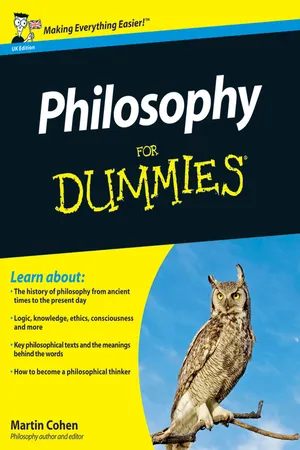Part I
What Is Philosophy?
In this part . . .
Philosophy is a pretty posh name for a pretty posh subject. Not one most of us need know anything about, you’d think. Gardening, how to drive cars, maybe a bit of computers these days – but philosophy? Wake me up when the professor’s gone!
But philosophy’s not boring or useless at all. This part explains why you actually just might find it incredibly useful to read the rest of the book, and why you really might enjoy finding out all about those strange philosophical questions, puzzles and ideas. Ready? Now get stuck in!
Chapter 1
What’s Philosophy All About?
In This Chapter
Making light work of some common misunderstandings of philosophy Getting a handle on some of the big ideas Delving back into ancient history and exploring the origins of key philosophical texts In this chapter we find out ‘what philosophy is’ – and what it used to be too (which are not quite the same thing). We immediately solve one of philosophy’s biggest problems – the problem of knowledge – and we look at the experiences of a greedy chicken and a sock with a hole in it.
Defining the Job
Philosophy is the ‘no-man’s land’ between science and theology, under attack from both sides.
– Bertrand Russell
Or, as philosophers might prefer to put it, science and religion are really two slices of bread, with philosophy the tasty bit in the middle. Scientists reduce the world to ‘matter’, make the world into a machine and destroy free will and purpose. On the other hand, spiritual types, who are searching for a purpose and the freedom to find it, are attracted to religions and to all those ‘irrational’ activities, such as astrology and watching TV. And they don’t feel the need to get anything done. Between the two camps, it seems there’s not much room left for philosophy!
From the outside, philosophy seems to be a rather peculiar, not to say pointless, subject full of unanswerable riddles and questions like ‘Is the King of France bald?’ or ‘Does that table exist?’ that no one in their right minds would ask anyway.
Indeed, philosophy courses often start off (as if determined to disprove the point, but inadvertently just reinforcing it) by asking, ‘What is philosophy?’ – a question that no self-respecting study would normally need to ask. What is chemistry? What is cooking? What is geography? Yet philosophers certainly seem to like asking these ‘what is’ questions, and asking it about their own subject seems to them to be quite the right thing to do. The point for them, after all, is to ask questions, not to answer them.
So what is philosophy?
Philosophy is a subject that has no particular content and covers no particular area. It is, rather, a kind of intellectual cement that attempts to stick the rest of the (rather grand sounding) intellectual edifice together.
Or put another way (less grand sounding), philosophy is a kind of manure. Pile it high, in a few places, and it simply rots and stinks. But spread it around and it becomes surprisingly useful. That was the view of some of philosophy’s defenders at the end of the last century. At the same time, people all over the Western World were asking the question ‘What’s the point of philosophy?’ and had decided there wasn’t one. People were beginning to see philosophy departments that were training people to ask strange unanswerable questions or to repeat obscure chunks of ancient texts as wasting their time. In the cold light of economic downturns, critics considered the efforts of serious philosophers to investigate the following sacred problems of philosophy and the like as a waste of money:
How do I know God exists? How do I know the world exists? If a tree falls in a forest and there’s no one there to hear it, does it make any sound? So what is the point of philosophy?
But, on the other hand, the efforts of practical people to make sense of their useful subjects – doctors, lawyers, astronomers, physicists, chemists, historians, linguists; you name it, they need to do it – always seemed to come back to certain paradoxical or tricky questions that are, essentially, well, philosophical. So even as philosophy as a hobby of the leisured classes went out one door, in came philosophy as a practical study – in the form of mini philosophy courses for medical ethics or business ethics or critical thinking and (for the scientists) theories of space and time.
And this in a way was a return to the roots of philosophy – because for the Ancient Greeks (who invented the word, but certainly not the activity – whatever you may read elsewhere!), philosophy is fundamentally a guide to action – helping to answer the perennial question ‘What should I do’? Loving Wisdom
It makes good sense for a lot of philosophically-minded people today to avoid the use of the word philosophy and study practical questions instead.




